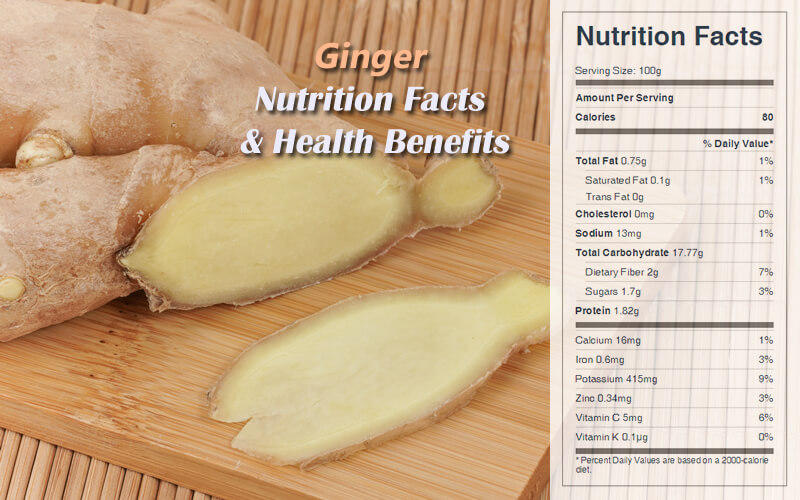Ginger Nutrition Facts & Health Benefits
Ginger is a fragrant kitchen spice and a common spice used worldwide, whether for meals or as a folk medicine. Ginger can be used for a variety of food items such as vegetables, candy, soda, pickles, and alcoholic beverages. Here are nutrition facts & health benefits of ginger.
Raw ginger is 79% water, 18% carbohydrates, 2% protein, and 1% fat. In 100 grams raw ginger supplies 333 kilojoules of food energy and contains moderate amounts of vitamin B6 and the dietary minerals, magnesium and manganese, but otherwise is low in micronutrient content.

Raw Ginger Nutrition Facts Label
Health Benefits of Ginger
Ginger is widely thought of as an anti-nausea agent or used to alleviate stomach upset. Ginger aids digestion and is unexpectedly useful against nausea. Clinical trials have shown it to be more effective than the standard drugs against motion sickness. Ginger is so much more than an anti-nausea agent. It has antioxidant, anti-inflammatory, and antibacterial properties and the potential to manage and prevent diseases including cancer, cardiovascular diseases, diabetes, obesity, and more!
Historically, ginger has a long tradition of being very effective in alleviating symptoms of stomach discomfort. In herbal medicine, ginger is regarded as an excellent carminative (a substance that helps eliminate intestinal gas) and intestinal spasmolytic (a substance that relaxes and soothes the intestinal tract). The possibility that gingerol, the main active component in ginger and the one responsible for its distinctive flavor, may inhibit the growth of human colorectal cancer cells.
The phenolic compounds in ginger are mainly gingerols, shogaols, and paradols. Gingerols are abundantly found in fresh ginger; with heat gingerols transforming into shogaols, and further, through hydrogenation, into paradols.
The anti-inflammatory properties of ginger have been known and valued for centuries. In the early 1970s, scientists identified ginger's ability to inhibit prostaglandin biosynthesis. This discovery identified ginger as an herbal medicine that has similar pharmacological properties to anti-inflammatory drugs.
Another benefit is that it has none of the side effects of conventional antinausea drugs, and pregnant women and children can use it safely. Fresh ginger grated into hot lemon and honey as a bedtime drink can stop a cold in its tracks. In addition to its ability to inhibit prostaglandins, ginger also suppresses leukotriene biosynthesis by inhibiting 5-lipoxygenase. With this dual mechanism to block inflammatory pathways, ginger may have a better therapeutic profile with fewer side effects than NSAIDs such as ibuprofen.
Ginger is also rich in zinc, which is an essential nutrient for our gut microbiota. Zinc decreases intestinal lipoxidation as well as intestinal permeability. Zinc also affects stomach acid production. Hydrochloric acid production depends on zinc, and low stomach acidity can cause several digestive problems. Decreased levels of hydrochloric acid could indicate a zinc deficiency. Zinc is also important in regulating the gut lining and modifying the gut microbiome. Studies have found that the beneficial bacteria lactobacillus and streptococcus increase with zinc supplementation.
Health Tips
Allergic reactions to ginger generally result in a rash. Although generally recognized as safe, ginger can cause heartburn and other side effects, particularly if taken in powdered form. It may adversely affect individuals with gallstones, and may interfere with the effects of anticoagulants, such as warfarin or aspirin.
There is no clear evidence that taking ginger to treat nausea during pregnancy is safe. Ginger is not effective for treating dysmenorrhea. There is some evidence for it having an anti-inflammatory effect, and improving digestive function but insufficient evidence for it affecting pain in osteoarthritis. The evidence that ginger retards blood clotting is mixed.
Choose and Storage
Choose fresh ginger over the dried form of the spice whenever possible, since it is not only superior in flavor but also contains higher levels of gingerol and ginger's active protease.
Choose firm ginger roots that are smooth and free of mold. Mature ginger, the more widely available type, has a tough skin that requires peeling. When purchasing dried ginger, try to select organically grown ginger that is less likely to have been irradiated.
Fresh ginger can be stored in the refrigerator for up to three weeks if it is left unpeeled. Store unpeeled ginger in the freezer for up to six months. Keep ground ginger in a tightly sealed glass container in a cool, dark, dry place. If stored in the refrigerator, it will last about a year.